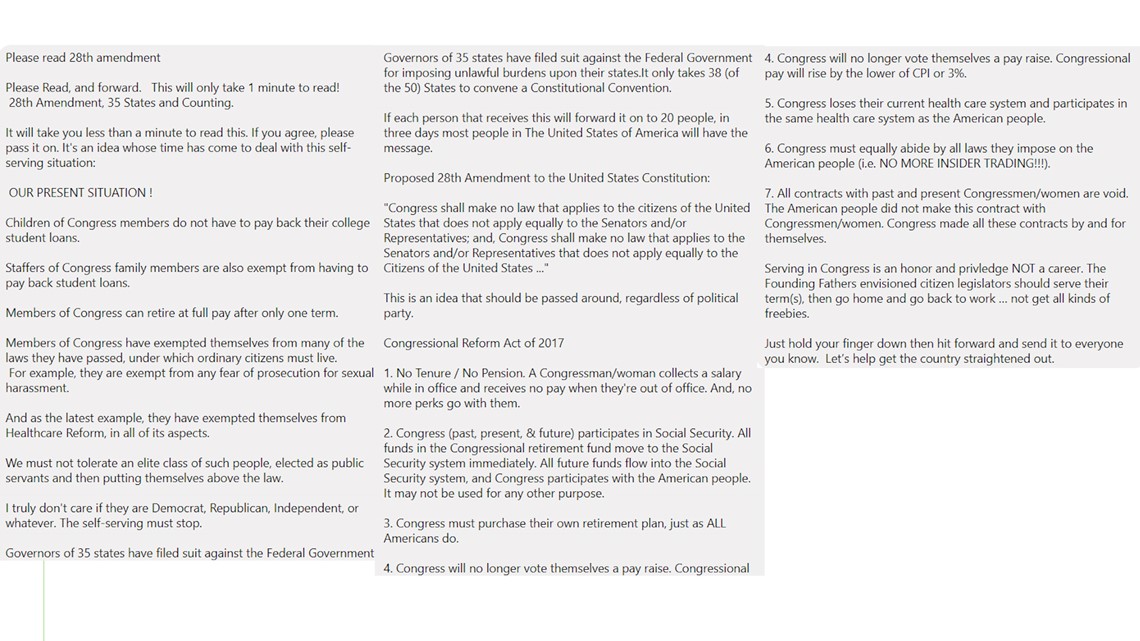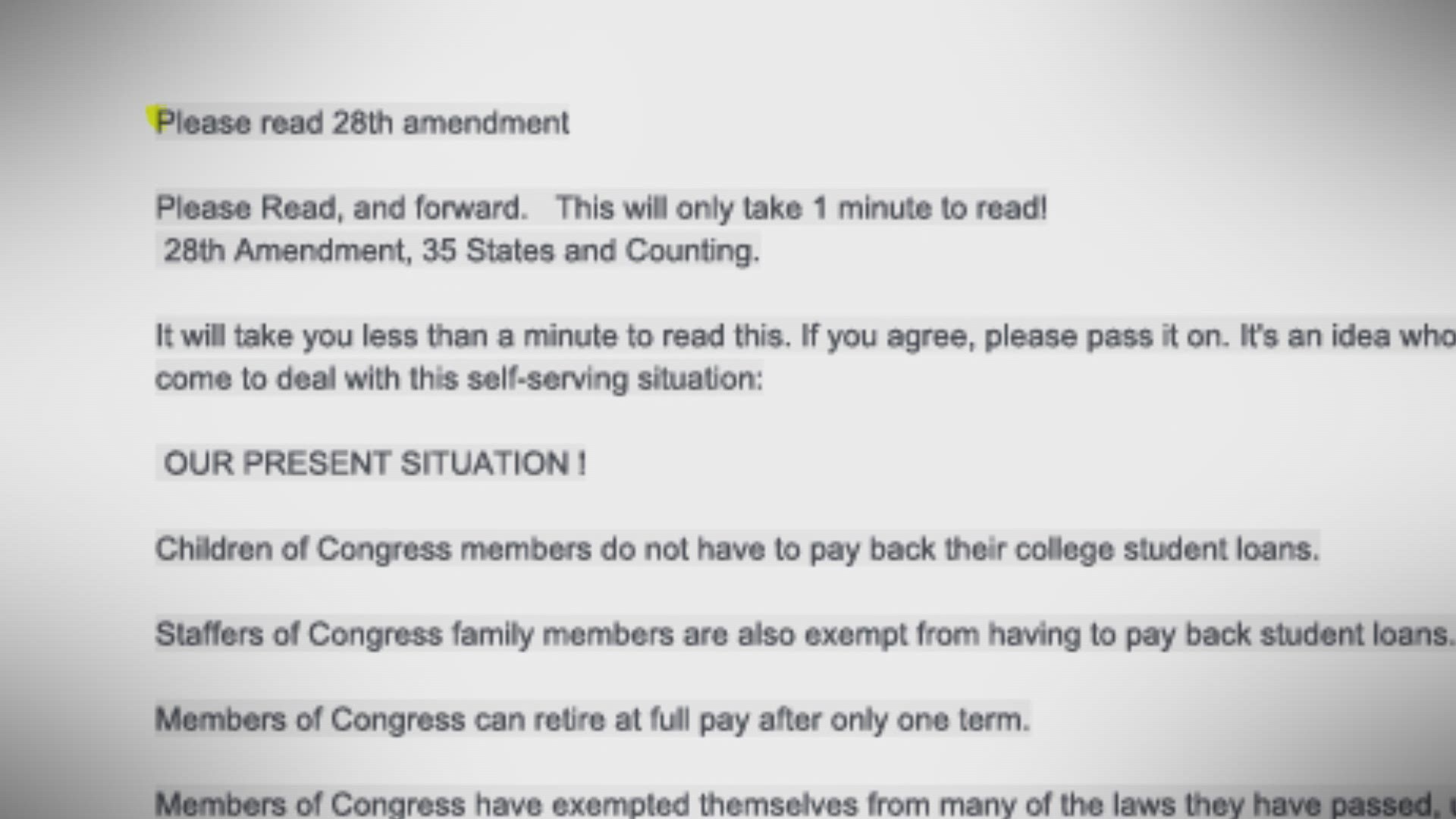A viral “chain message” is making the rounds on social media, petitioning for a 28th amendment that will hold members of Congress accountable to the same laws as all other Americans.
It appears in different forms.
Here’s the full text making the rounds on Facebook.


So, are members of Congress really circumventing laws and acting outside of what they legislate to all Americans? How much of this is true?
Student Loans
The claim states that children and staffers of members of Congress are exempt from paying back their student loans.
While the claim likely stems from a real federal hiring practice, how it's being presented here is false.
The Federal Student Loan Repayment Plan grants federal agencies to make payments for student loans of employees as a recruitment plan.
Those in positions of “competitive civil service” cannot benefit from this plan, meaning those in Congress don't receive its benefits.
Furthermore, federal agencies cannot pay more than $10,000 to a student’s loans in a single year or $60,000 to a single employee in their time with the agency. If the employee does not remain with the agency for at least three years, they must reimburse the agency for what was paid.
It’s also important to distinguish that this plan does not forgive anyone’s student loans. The agency pays off some of the debt to the loan holder.
So we can VERIFY that this claim is FALSE.
Retirement Pay and Social Security
The petition claims that members of Congress can retire at full pay after a single term. In some versions of the petition, it claims members of Congress don’t have to pay social security.
A Congressional Research Service report hosted on the Senate’s website states that members of Congress are eligible for full pensions at the age of 62 if they have completed at least 5 years of service. This also extends to a person at the age of 50, who has completed at least 20 years of service, and to people of any age who have completed at least 25 years of service.
The amount of pension depends on the years of service and the average of the highest three years of salary for the lawmaker.
In addition, the starting amount of retirement pay for a member of Congress cannot exceed 80% of his or her salary while serving.
The Senate website also confirms that members of Congress have been required by law to contribute to Social Security since 1984.
So the petition's claims about retirement pay and social security are also FALSE.
Exemptions from Sexual Harassment Laws
Another false claim presented in the petition is that members of Congress are exempt from a number of laws, specifically those involving sexual harassment.
However, Section 201 of the Congressional Accountability Act specifically prohibits members of Congress from discrimination or harassment of employees based on race, color, religion, sex, or national origin.
So this claim is FALSE.
Exemption from Healthcare Laws
The petition also claims members of Congress have exempted themselves from healthcare reform laws.
However, the text within the Affordable Care Act specifically requires Congress to participate.
The only healthcare plans that can be made available by the federal government to members of Congress are plans created under the Affordable Care Act or plans offered through exchanges created by the Affordable Care Act.
This claim is FALSE.
Congressional Pay Raises
At least one version of this petition insinuates Congress can give themselves pay raises and proposes that ability would be stripped by a 28th Amendment.
However, a sitting member of Congress can't give themselves pay raises. That was laid out by the 27th Amendment, the most recent amendment to the Constitution.
The 27th Amendment made it so if members of Congress vote to give legislators a pay raise, it does not take effect until after the election of a new Congress.
Therefore, the only way a member of Congress can vote to give themselves a pay raise is if they win the next election even after voting for such a measure.
This claim is MOSTLY FALSE.
Constitutional Conventions
The petition also claims that currently 35 states have filed lawsuits against the federal government for imposing unlawful burdens on their states and 38 states are needed to call for a Constitutional Convention.
According to Article V of the Constitution, two-thirds of states need to call for a Constitutional Convention for one to occur. That’s 34 states.
Therefore, if 35 states had already agreed to one it would be set into motion without needing any more states to sign on.
Additionally, the vague wording that doesn’t name which states are behind this movement and which states aren’t yet calls into question the validity of this claim.
This claim is FALSE.
However, 38 states wasn’t a number pulled out of the blue. The other way to ratify a new amendment requires the support of two-thirds of both chambers of Congress and three-fourths of the states. That’s likely how they wound up on 38 states.
What Else We Found
These claims have been floating around the internet for awhile. In fact, you can find it popping up for almost a decade.
And if the issues were real, it’s highly unlikely there would be no evident progress and no news coverage on it during the last nine years.

